 Petzlover
PetzloverSilken Windhound is originated from United States but Sulimov is originated from Russia. Silken Windhound may grow 10 cm / 4 inches higher than Sulimov. Both Silken Windhound and Sulimov are having almost same weight. Silken Windhound may live 4 years more than Sulimov. Silken Windhound may have less litter size than Sulimov. Silken Windhound requires Low Maintenance. But Sulimov requires Moderate Maintenance
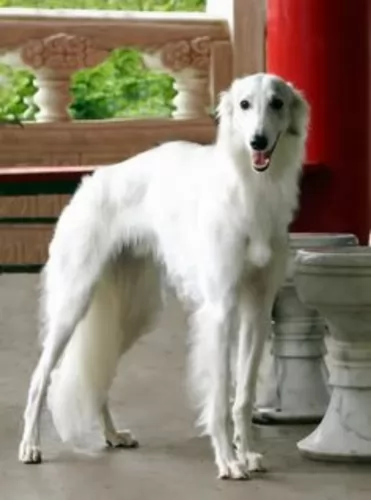 The Silken Windhound is a breed intentionally developed by Borzoi and Deerhound breeder, Francie Stull. Although the first litter of the Windhoud was not born until 1995, their development began in discussions ten years later. Bred as a cross between her beloved Deerhounds and Borzoi, the first Society for the breed formed in 1999 and they were recognized by the UKC in 2011.
The Silken Windhound is a breed intentionally developed by Borzoi and Deerhound breeder, Francie Stull. Although the first litter of the Windhoud was not born until 1995, their development began in discussions ten years later. Bred as a cross between her beloved Deerhounds and Borzoi, the first Society for the breed formed in 1999 and they were recognized by the UKC in 2011.
Ms. Stull wanted another breed for her kennel and decided on a smaller sighthound than her Borzoi. She wanted a long coat, a good temperament, good health, and possessing the same athletic abilities, grace and poise as the sighthounds that are larger. She developed the Silken Windhound based on this vision.
With this in mind, the kennel purchased the pick of a litter from the American and English Borzoi Champion bitch, Stillwater Virginia Reel. This puppy was eventually bred to Stillwater White Lightning and produced puppy that was a blue brindle. This dog, Stillwater Kristull Peacock, had the coat, personality and structure that Ms. Stull wanted for the new breed. She was bred to Deerhound Windsprite Autumnal Xenon to form the foundation for the Silken Windhound.
Over time champion Borzoi were bred with multi-generation Whippet based dogs and small Whippet from coursing and show lines. Finally, all of this work was rewarded with an incredible little sighthound to fit in the line of sighthounds between the giant and large breeds and the smaller whippet type breeds.
The Silken Windhound lives today in 24 different countries. They take their place in hound competitions all over the world in obedience, lure coursing, and racing. They are a Limited Stake Breed in the ASFA and competed with 40 other dogs in 2010. Then they were accepted by the NOFCA or National Open Filed Coursing Association, also in 2010. Finally, in 2011 they were fully accepted by the UKC.
The Silken Windhound is recognized in addition to the UKC, by the Dog Registry of America, the Rarities Inc., the American Canine Association, the Kennel Club of Slovenia, the American Pet Registry, Inc., the International Silken Windhound Society and the International, All-Breed Canine Association of America.
This Russian jackal-dog-hybrid is thought to have developed from golden jackals and Lapponian Herders. In fact the dog was developed by a certain Klim Sulimov to be a robust security- and sniffer dog at Aeroflot, a Russian airline.
Jackals were used because it is believed that they have a better sense of smell than any domesticated dog there is. The Jackal can also perceive things at a distance. Later on, other dogs were also bred into the line, making it an intelligent dog with an excellent sense of smell.
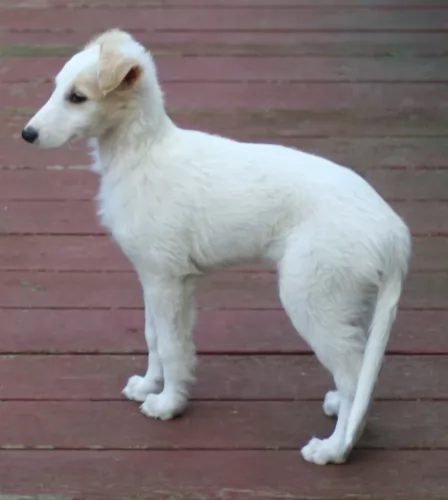 The Silken Windhound is a breed of beautiful, athletic medium sized dogs. They have the long coat, athletic build and classic lines of the sighthound/coursing dog. Just looking at them and you know they have strength, balance and grace in those medium sized bodies. Their running ability is exceptional. They perform well in the confirmation rings.
The Silken Windhound is a breed of beautiful, athletic medium sized dogs. They have the long coat, athletic build and classic lines of the sighthound/coursing dog. Just looking at them and you know they have strength, balance and grace in those medium sized bodies. Their running ability is exceptional. They perform well in the confirmation rings.
They are sine boned, balanced with smooth muscles – a sleek hardy looking dog. They have almond-shaped, large, dark eyes with small folded ears. Looking in their faces you see intelligence, friendliness and alertness. The head is long with a well balanced muzzle and a dark, slightly down-turned nose. Her lips are dark and full and her neck long and slender. The Silken Windhound must have a flexible loin because they have a gallop of double suspensions and are amazingly fast. A deep chest is also a must with a flexible, curving tail. Her legs are straight and long, as she is built for speed.
Th Sulimov looks like, and also has characteristics of jackals and huskies. The body is large, the ears are triangular and erect, the eyes bright, alert and enquiring and the muzzle is long.
The legs of the dog are slim but strong, like the Jackal and the tail is long and bushy. The coat is fairly long, smooth and thick and can be in a range of colors such as tan, fawn, grey, white and black.
The Sulimov is a medium sized dog and stands at between 40 and 50cm in height and weighs between 12 to 15kg.
This hybrid dog is brave, confident, wily, robust, loving, affectionate and loyal. They are intelligent too and you won’t have any trouble training him.
The truth is, there isn’t much information on the personality of this breed, but they are eager to please, are full of energy and can be cheerful and feisty, even in extreme temperatures.
They’ve been bred for work and aren’t a typical family pet. Because of their wild side, they aren’t recommended for the first time dog owner or for a family pet where there are children.
If you were to keep one, it would be far better suited to life on a farm where it could have a role to play. Life in the city for this active hybrid is out of the question.
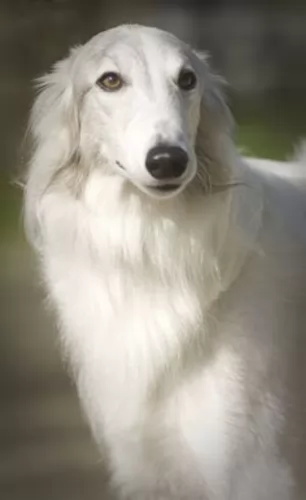 1. Children friendliness – they are great with children and would romp with them all day.
1. Children friendliness – they are great with children and would romp with them all day.
3.Adaptability Like most sighthounds they can be couch potatoes but being medium sized they can live just about anywhere as long as it is inside.
4.Learning ability - They are smart but their learning ability can be hampered by their stubbornness.
The Sulimov makes an excellent working dog and in fact he loves to be busy. They've got an unusual feature - their tails, which are normally curled up and over the back like a husky, hang down limply when tired. Their handler know when these dogs are ready to call it a day.
They are essentially working dogs, being loyal and devoted to their handlers, but wouldn't be considered as an ideal family pet.
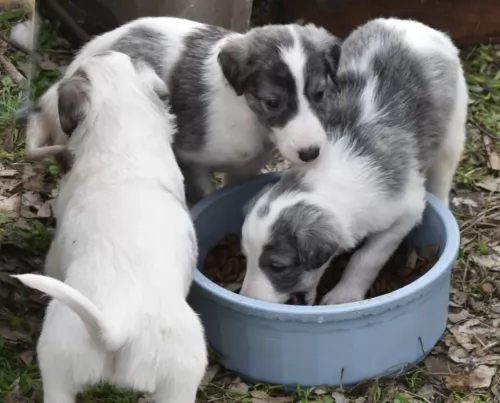 Most inherited diseases and conditions are rare. There is some drug related sensitivity, especially to ivermectin, and some dogs carry a MDR1 (multi-drug resistance gene) that is defective. Breeders are attempting to breed this out of the Silkens. A few other rare instances of concern include:
Most inherited diseases and conditions are rare. There is some drug related sensitivity, especially to ivermectin, and some dogs carry a MDR1 (multi-drug resistance gene) that is defective. Breeders are attempting to breed this out of the Silkens. A few other rare instances of concern include:
There is ongoing debate about the health of hybrid dogs against that of purebred dogs. Hybrids inherit genetic dispositions that their parents would have, including certain heath issues.
Parasites are a huge cause of disease in dogs. Apart from ticks and fleas, internal parasites live inside the gastrointestinal tract and can be things like hookworms, tapewarms and roundwarms among others.
Parasites are usually transmitted when the dog ingests parasite eggs in contaminated water, food, feces or soil.
It’s important to get your dog treated as these parasites can cause weight loss, swollen abdomen, malnutrition, diarrhea, vomiting and anemia. Apart from this, they can affect people too. Fortunately these parasites are treatable and easy to prevent.
Other common dog ailments to look out for include bloat, obesity, cancer and hip dysplasia.
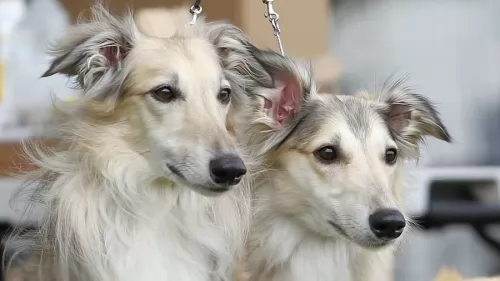 1.Feeding the puppy This is a medium sized, active breed. They need high quality dog food with plenty of protein. Feed them 3 times a day from a food made for high energy active medium sized breeds.
1.Feeding the puppy This is a medium sized, active breed. They need high quality dog food with plenty of protein. Feed them 3 times a day from a food made for high energy active medium sized breeds.
2.Feeding the adult - Feed them 2 times a day from a food made for high energy active medium sized breeds.
4. Games and Exercises The breed is active, and they love to run. They need daily exercise and they usually excel at flyball, agility, obedience and therapy. Obviously, they are very good at lure coursing and racing. They love to run or jog with you.
This is a medium sized dog so you can buy a high quality dry kibble for him manufactured for medium sized energetic dogs.
Try and avoid the low quality dog foods which come with lots of ingredients that are plain ordinary bad for your dog, and can jeopardize his health.
Try and feed him some home-made food too – boiled chicken, brown rice or pasta and some nutritious vegetables such as spinach,sweet potatoes and carrots. Chop it all up and add some of it to the dry kibble twice a week.
You can also provide him with some raw fish and raw red meat occasionally as this keeps the skin and coat healthy. Make sure he always has fresh, cool water available.
Have him trained and socialized. As it is, for the job he does as a security dog, he is trained and socialized.
Provide him with lots of exercise – walks, ball games, exercises that stimulate mind and body.